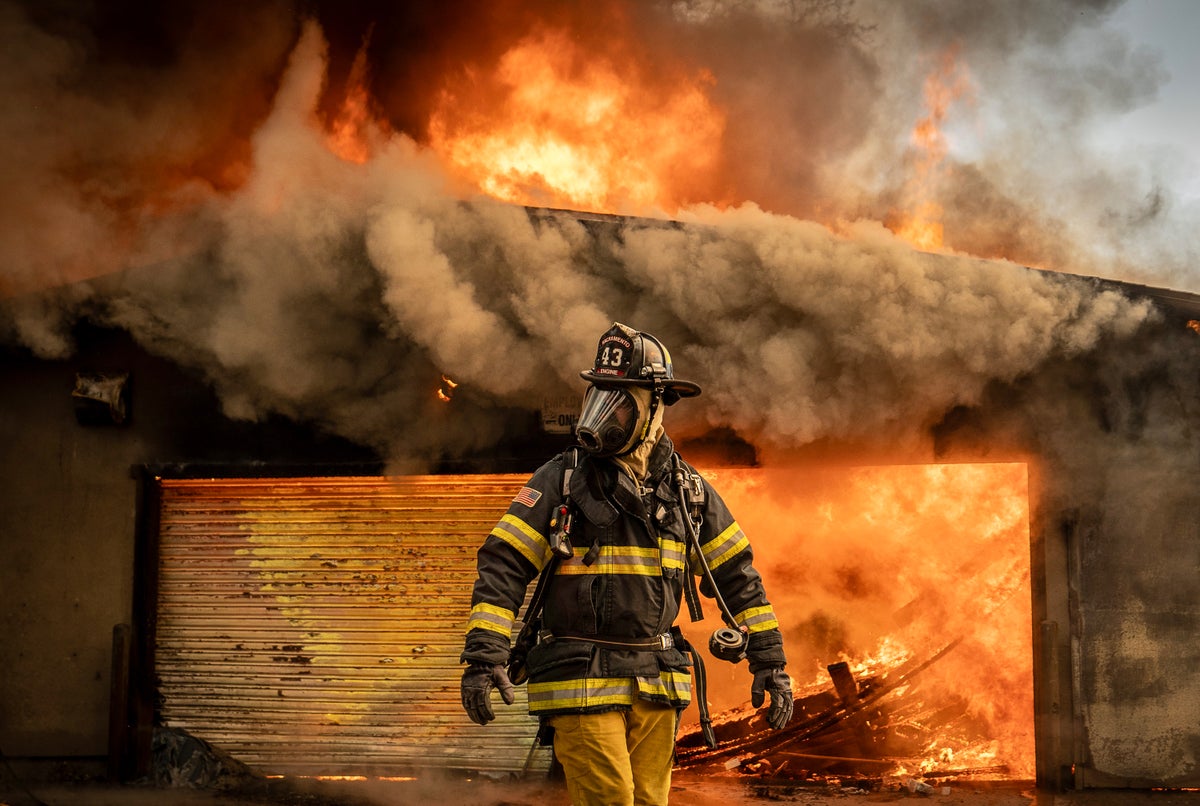Key events
Filters BETA
Award for dedicated Australian cancer researcher
A Queensland scientist at the forefront of international genetic cancer research has been recognised for her groundbreaking study of breast, ovarian and other cancers.
Professor Georgia Chenevix-Trench, from the QIMR Berghofer Medical Research Institute, has been awarded the 2022 GSK Award for Research Excellence for developing personalised risk prediction methods and accelerating cancer research worldwide.
Breast cancer is the most common cancer affecting Australian women, with approximately 57 people diagnosed every day in 2022.
Professor Chenevix-Trench’s said she had dedicated her life’s to helping those at risk of hereditary cancers.
I’ve had an interest in helping those affected by hereditary cancers my entire life.
My focus has been to understand how genetic variants act as a determining factor in developing breast cancer. Unless we know how these genomes operate in relation to cancerous cells, we won’t be able to translate the knowledge we have gained into tangible treatment options and preventative solutions for patients.
Professor Chenevix-Trench will use the $100,000 grant to purchase equipment for real-time cell analysis.
-AAP
Cait Kelly
Farmers fined for exploiting vulnerable workers
Farmers across the country have been fined for defying workplace laws designed to protect vulnerable workers, including failing to provide them with proper payslips.
The Fair Work Ombudsman has fined growers and labour hire providers in north-west Victoria’s Sunraysia region, South Australia’s Riverland, and NSW’s Coffs Harbour and Grafton a combined $78,362 for breaching payslips and record-keeping laws in the last year.
In contrast, there has been high levels of compliance found in the Queensland growing regions of Wide Bay and Moreton Bay.
Fair Work Inspectors have issued a combined 31 fines totalling $35,964 in Sunraysia, $22,644 in the Riverland and $19,754 in Coffs Harbour and Grafton.
The Fair Work Ombudsman, Sandra Parker, said employers were expected to apply the rules correctly:
Record-keeping is the bedrock of compliance. Employers who fail to meet these obligations are more likely to be underpaying, whether intentionally or not. It is concerning that Inspectors have needed to issue close to $80,000 in fines to employers who breached payslip and records laws.
Since the regulator began its agriculture strategy in December 2021, it has investigated 237 businesses in hotspots across Australia where intelligence suggests non-compliance may be present.
The Fair Work Ombudsman has investigations into more than 80 agriculture employers ongoing nationally.
Hyundai issues recall after defect found in braking system
Some 19,500 Hyundai cars have been recalled over concerns they may spontaneously ignite if moisture reaches an internal component.
The recall affects Hyundai ix35 (EL) cars, built from 2014 to 2015, after a manufacturing defect was found in the circuit board in the anti-lock braking system (ABS).
The defect appears to be the same found in 200,000 other Hyundai models built between 2006 and 2021.
The defect could result in a vehicle fire “even when the vehicle is turned off”, the recall notice said. The notice said:
Affected vehicles should be parked in an open space and away from flammable materials and structures, ie not in a garage.
If your vehicle displays an engine warning light, please stop driving and contact your local Hyundai dealer.
Bannister Law on Friday said the ABS control module defect posing a possible fire risk had resulted in nearly 300,000 Hyundai and Kia models being recalled across Australia.
They urged affected owners to register for their class action against the car makers.
– AAP
ANU study finds everyday discrimination against Indigenous Australians
Everyday discrimination could make up as much of half the burden of psychological distress among Indigenous people.
In one of the first studies of its kind, Australian National University researchers have found 30% of Indigenous adults experience high levels of psychological distress compared with 13% of non-Indigenous adults.
They found about 47% of the gap between the two demographics was likely to be caused by different types of interpersonal racial discrimination.
These include those in everyday interactions, such as being treated with less respect by others or being unfairly targeted by police.
The study’s co-author, adjunct professor Janine Mohamed, said eliminating discrimination would help alleviate the higher burden of psychological distress experienced.
The potential harms from discrimination and racism must be recognised if we are to leverage policy reform that impacts the health of our peoples.
All levels of government have committed to work to eliminate racism under the 2021 national agreement on closing the gap – we are calling on policymakers, organisations and individuals to honour the national agreement and to make real change.
The findings of the research were based on submissions from 10,000 Indigenous adults in the Mayi Kuwayu study, a national examination of Indigenous wellbeing.
Dr Katie Thurber, one of the co-authors, said while the research was broad it was yet to capture the full extent of racism experienced by Indigenous people.
The experiences captured in our study are just the tip of the iceberg.
We have not captured all forms of interpersonal discrimination that Aboriginal and Torres Strait Islander people face, or the ubiquitous and insidious impacts of structural racism.
University of Canberra chancellor and study co-author Prof Tom Calma said addressing racism was a necessary first step to improve wellbeing and closing gaps with non-Indigenous people.
If the contribution of interpersonal discrimination – let alone the whole system of racism – could be this big, how can we justify inaction?
There is a clear need for supports for those who have experienced interpersonal discrimination and racism.
The study has been published in a special edition of medical journal the Lancet.
– AAP
Study finds 15,400 ‘excess deaths’ due to Covid-19 in Australia
A comprehensive analysis of the impact of Covid-19 on fatality rates has found there were 15,400 “excess deaths” across Australia in the first eight months of 2022, or 13% more than predicted.
The measure captures not only confirmed virus deaths but those incorrectly diagnosed and reported, and those from other causes attributable to the crisis such as health systems being overwhelmed, resources being diverted or fewer people seeking treatment.
The Actuaries Institute’s Covid-19 mortality working group estimates 8,200 of the fatalities were directly due to the virus, with another 2,100 having it as a contributory cause and the remaining 5,100 featuring no link.
The deaths peaked in the last week of July and fell across August.
Spokeswoman for the group, Karen Cutter, said all jurisdictions except the Northern Territory had “significant levels of excess mortality in 2022”.
Generally, about half of this was due to deaths from Covid-19, with the exception of Tasmania that had relatively fewer deaths from Covid-19 and more deaths from other causes.
She said a lower measured excess mortality for WA reflected the later introduction of the virus there compared with the eastern states.
With its relatively young and affluent population, the ACT experienced lower excess mortality than the larger states while the NT, also with a very young population, showed a low net impact.
The Working Group said it was notable there were excess deaths in almost all age bands.
While the number and percentage of excess deaths were higher in older Australians, they were notable in all age groups and generally higher for females.
– AAP

Peter Hannam
Discussions still ongoing over energy but NSW satisfied with outcome
With the “first ministers” not due to start their meeting until mid-afternoon, it’s possible we won’t get a clear outcome until 5pm (AEDT) or later. (Cue nervous TV and print news chiefs.)
Guardian Australia understands that NSW is “happy” with the outcome. While it won’t involve compensation for royalty losses, there will be final assistance to support some businesses and households.
Queensland remains the harder nut to crack, not least because state-owned power plants make up most of the electricity sector unlike in NSW where generators were privatised years ago by the Coalition government.
It remains to be seen whether a cap on gas and coal prices will have a lasting impact on the wholesale electricity market in eastern Australia – which is ultimately what the intervention is all about.
As we wrote this morning, there’s reason to be sceptical that the short-term impacts will be significant, and getting to longer-term solutions for high energy prices won’t be that easy, either:
US tip leads to arrest of alleged scammers
The alleged leaders of the Australian arm of a $150m global financial scam have been arrested at Sydney and Melbourne airports after an investigation sparked by a tip-off from the United States Secret Service.
The two men, aged 27 and 24, were arrested two weeks ago trying to board flights to Hong Kong, which had been purchased as one-way tickets.
More than $22m in 24 bank accounts allegedly linked to the criminal syndicate has been seized and two other Australian-based operatives have been arrested after the months-long investigation, Australian federal police said on Friday.
The group allegedly deployed a scam that involved manipulating legitimate online trading platforms to dupe victims into believing their investments were generating high returns.
While the majority of victims were based in the United States, the US Secret Service in August alerted the AFP-led Joint Policing Cybercrime Coordination Centre in August about Australian links.
Based on victim reports to police, more than US$100m (A$148m) in losses worldwide have been attributed to the syndicate.
The two Australian alleged controllers have been remanded in custody on serious money laundering charges. They are due to face Sydney’s Downing Centre local court on 18 January.
Two other men, both aged 19, have also been charged over their alleged roles. They are due to face a Sydney court in January on one count each of recklessly dealing with proceeds of crime.
– AAP
Mourners fined during Archie Roach funeral
Grieving mourners who were fined for running red lights during late music icon Uncle Archie Roach’s funeral procession will not have them overturned.
Victoria police confirmed at least seven infringements totalling about $462 per driver were issued to mourners travelling as part of the motorcade, including the driver of a hearse carrying Roach’s body back to country in August.
Despite a request to have the fines dismissed ahead of Roach’s state memorial next week, a police review determined each of the drivers committed a “serious traffic offence”.
A police spokesperson said in a statement that “disobeying a red light signal is considered a serious traffic offence.”
It poses a significant safety risk both to the driver and other road users. Seven infringements were issued for disobeying a traffic control signal in relation to this matter.
Victoria police said it offered the funeral organisers police assistance for the cortege’s movement through the Melbourne area, which was declined.
Roach, a proud Gunditjmara and Bundjalung man, tragically died in July at age 66.
A funeral was held in August and his body was driven through his old stomping grounds in Melbourne, including Collingwood, Fitzroy and St Kilda before being taken back to Gunditjmara Country, near Warrnambool.
The premier, Daniel Andrews, announced a state memorial would be held in Roach’s honour at the Sidney Myer Music Bowl on 15 December.
– from AAP
In a world full of troubles, take heart knowing that Brady the pooch is safe and well.
Queensland fire and emergency services rescued Brady after he fell into a hole.
There’s a joke in there about curiosity and cats, but I’m just not finding it right now.
The Burpengary Fire and Rescue crew were called out to help Brady the dog yesterday after he fell into a hole.
The crew worked for two hours while keeping Brady safe with oxygen, water and blankets.
After a huge effort, Brady was back in the hands of his family
pic.twitter.com/Exx43yncO0
— Qld Fire & Emergency (@QldFES) December 8, 2022
NSW records 48 Covid deaths in past week
Forty-eight people with Covid-19 died in New South Wales over the last week, with the state recording 40,194 new cases, and averaging 1,526 people in hospital and 40 in ICU.
The previous week 32 deaths were reported, while 25 deaths were reported the week before that.
COVID-19 weekly update – Friday 9 December 2022
In the 7 days to 4pm Thursday 8 December:
– 40,194 new cases of COVID-19 have been recorded: 16,076 rapid antigen tests (RATs) and 24,118 PCR tests
– 48 lives lost pic.twitter.com/94kcICew2V— NSW Health (@NSWHealth) December 8, 2022
Victoria records 85 new Covid deaths in past week
Eighty-five people with Covid-19 died in Victoria last week, with the state recording 27,790 new cases on Friday morning, averaging 682 people in hospital and 28 in ICU.
This is an increase of about 50% on the number of deaths reported in recent weeks, with 54 deaths and 26,971 cases reported the previous week and 62 deaths and 22,281 deaths in the week before that.
This week we reported 27,790 new cases with a daily average hospital occupancy of 682 and 28 patients in ICU.
85 deaths were reported in the past 7 days.
Our thoughts are with those in hospital, and the families of people who have lost their lives. pic.twitter.com/rf0RHOgyq7
— VicGovDH (@VicGovDH) December 8, 2022
‘Without coal and gas from Australia, I think Tokyo will go dark’: Japanese ambassador
The Japanese ambassador to Australia, Shingo Yamagami, has spoken to ABC radio this morning where he said Australia’s second biggest trading partner has confidence any coal or gas price won’t affect the export of energy to Japan.
Let me tell you that without coal and gas from Australia, I think Tokyo will go dark. So in that regard, we place high importance to maintain coal and gas, both in trade and investment relationship, between Japan and Australia.
We have been repeatedly assured by the Australian government, including prime minister Albanese, resources minister Madeleine King, trade minister Don Farrell that Australia will remain a reliable supplier energy and that Australia will remain a safe destination for Japanese investment. We count on this relationship to be maintained.
Tasmanian court decision due on native forest logging
The Tasmanian supreme court will hand down a decision on a court case against Sustainable Timber Tasmanian challenging the lawfulness of native forest logging in the state.
The case was brought by Blue Derby Wild against the Forest Practices Authority in April and alleges apprehended bias after Sustainable Timber Tasmania were delegated the role of approving and policing its own logging plans.
In response to the case, the Tasmanian government attempted to pass retrospective legislation to head off the case.
A decision is expected by 3.30pm today.
Home affairs minister says allowing rejected asylum seekers to stay ‘not the right solution’
O’Neil is asked now about what the government plan’s are for the 70,000 people in Australia who sought asylum, were rejected and are working.
The issue is significant as Australia’s complementary visa system has historically denied people on some visas the right to work in Australia and are not entitled to government support. Where people have fled a country due to violence but have not been granted asylum, they are left in a limbo and forced to work illegally in a shadow economy to survive.
O’Neil would not be drawn on how the government plans to tackle the situation, instead saying the immigration system was “an absolute mess” under the previous government. She says there were millions of unprocessed visas “in the system, in the middle of the worst labour shortage since the second world war, and no plan to process them”.
We’ve got something we’ve actively avoided as a country, which is a group of undocumented workers who are vulnerable to exploitation.
However, O’Neil said that allowing these people to stay indefinitely was “not the right solution here”.
Data protection standards needed for businesses that handle customers’ sensitive information: O’Neil
O’Neil says though the risk from cyber-attacks can never be eliminated, the government would work to beef up Australia’s cybersecurity capacity with “fewer hacks very much a KPI”.
What we need to do is make sure that we design a system that keeps attacks out as much as we can. And there’s a lot of work to be done on that. But something else that we really need to get good at is getting back off the mat when we’ve taken a hit from a cyber point of view.
We’ve just got to get a lot better at working with the private sector in partnership to quickly fix the effects of cyber-attacks.
O’Neil also flagged that the government will look at what personal information is being obtained by businesses.
We need to have a conversation with businesses of this kind [that] hold this very sensitive information and set minimum standards for them about what data protections will be in place.
Minister says technology bringing cybersecurity concerns into Australian homes
The minister for home affairs and cybersecurity, Clare O’Neil, says Australia’s “national security environment” has undergone a “very radical change”.
O’Neil lists a fast warming climate, a much more powerful China and a quickly changing global world order that is “literally reshaping things before our very eyes”.
In previous decades these changes wouldn’t have affected Australians much at home, but because of technology, this is bringing these problems right into the household of Australians and we’re seeing that with cyber-attacks.
The minister says Australia is witnessing this change with attempts to influence its political systems, universities and harassment of diaspora communities.
We’re going into this very difficult step for decades where there’s a lot of competition around the globe, and there are certain things Australia is going to have to do for itself and cyber[security] is one of those.


















Discussion about this post